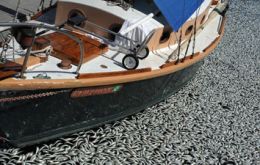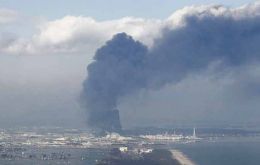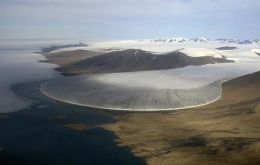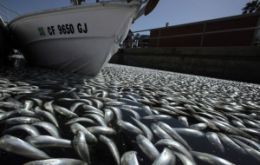MercoPress. South Atlantic News Agency
Environment
-
Monday, March 14th 2011 - 06:24 UTC
Dangerous neurotoxin could be responsible for massive death of fish in California

Dead fish found in the King’s Harbor Marina in Redondo Beach, California, this week have tested positive for a dangerous neurotoxin. The California Department of Fish and Game originally blamed the die-off on oxygen deprivation.
-
Monday, March 14th 2011 - 02:09 UTC
Chevron appeals 9.5 billion USD fine from an Ecuador court

US oil giant Chevron has launched a legal appeal against a 9.5 billion US dollars fine by an Ecuador court for polluting much of the country's Amazon region.
-
Sunday, March 13th 2011 - 00:33 UTC
Explosion at quake-damaged Japanese nuclear power station; 170.000 evacuated

An estimated 170,000 people have been evacuated from the area around a quake-damaged nuclear power station in north-east Japan that was hit by an explosion, the UN atomic watchdog says.
-
Saturday, March 12th 2011 - 05:33 UTC
Nuclear emergency and thousands of residents evacuated

The Japanese government declared a state of emergency at five nuclear reactors as cooling systems failed. Authorities battled Saturday to contain rising pressure at the plants damaged by a massive earthquake and were moving tens of thousands of residents from the area.
-
Saturday, March 12th 2011 - 05:21 UTC
Japan begins huge relief effort: hundreds killed but more feared disappeared

A mammoth relief mission is swinging into action in north-east Japan, a day after it was struck by a devastating tsunami, claiming hundreds of lives. Whole villages have been washed away and at least one town has been largely destroyed.
-
Friday, March 11th 2011 - 00:53 UTC
Decline of bees’ colonies threatens pollination, essential for growing more crops

More than a dozen factors, ranging from declines in flowering plants and the use of memory-damaging insecticides to the world-wide spread of pests and air pollution, may be behind the emerging decline of bee colonies across many parts of the globe.
-
Thursday, March 10th 2011 - 22:26 UTC
New Zealand cuts basic interest rate to help with earthquake recovery

New Zealand's central bank has cut the cost of borrowing to try to reduce the economic impact of the earthquake in Christchurch, the country's second largest city. The Reserve Bank of New Zealand cut the key interest rate 0.5 points to 2.5%.
-
Wednesday, March 9th 2011 - 21:17 UTC
Ice losses in both caskets and rising sea level faster than estimated

Ice loss from Antarctica and Greenland has accelerated over the last 20 years, research shows, and will soon become the biggest driver of sea level rise. From satellite data and climate models, scientists calculate that the two polar ice sheets are losing enough ice to raise sea levels by 1.3mm each year.
-
Wednesday, March 9th 2011 - 21:03 UTC
Critically low oxygen blamed for massive death of fish in South California

Critically low oxygen levels have been measured in a southern Californian harbour after millions of dead fish were washed up in Redondo Beach's marina, close to Los Angeles. A local scientist, Brent Scheiwe, said he took dissolved oxygen level readings in the harbour and found them at almost zero.
-
Wednesday, March 9th 2011 - 05:10 UTC
Wikileaks reveals Chilean government changed environment rules to please US interests

Wikileaks cables last week revealed that the U.S. Embassy in Santiago pressured Chilean government officials in 2009 to change environmental rules so that a controversial thermoelectric plant could be built.
